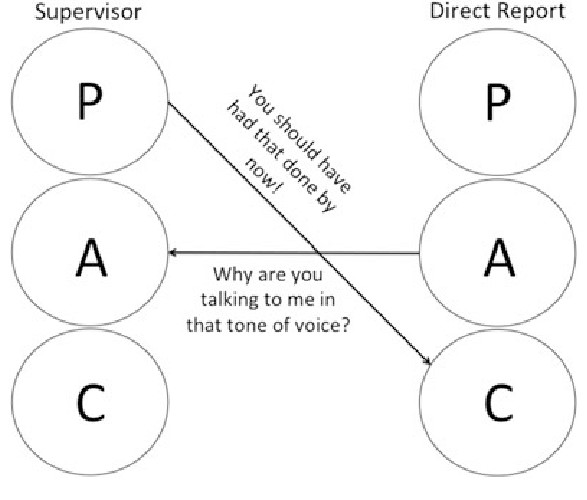I had this recent experience. During a meeting one of my colleagues went into an emotional tirade. He was ranting against a collective decision made in a meeting where he was invited but did not attend. He questioned the decision, and implied that those who took part were incompetent.

Some of us thought our colleague was really off somewhere.
Really off? This is the challenge, making sense of what’s going on in an exchange. What are people really trying to say? Behind the overt messages that we try to make sound rational are subtexts. We know these are the real messages, because we terminate conversations and even relationships when they are not recognized.
Discerning these subtexts is not hard if we had a model. The model I use is Transactional Analysis. First developed over 40 years ago, this psychoanalytic-based approach to the study of communications has since been validated by numerous studies.
The model posits that every person has an Inner Child and an Inner Parent, apart from the “manager” or the Adult who coordinates everything. Transactional Analysts are careful to point out that these three personalities are NOT objects, they are not three persons. Instead, they are thought of us modes or states that the same person expresses every time he or she communicates a thought or feeling. These ego states are observable, serving as pigeonholes to classify statements made.
Thus when I exclaim “Oh Wow!“, that classifies as having come from my Child mode or ego state. “We should always consult extraordinary expenses,” is coming from a Parent ego state. And when I say “Parking is full“, I’m making a statement of fact pertaining to the here and how, characteristic of the Adult ego state.
Without reducing the ego states to monotonic emotions, we may for convenience describe the Child as emotional, the Parent as judgmental, and the Adult as rational.
When we speak from a Parent ego state we usually communicate to a Child or a Parent ego state in our listener. “We shouldn’t be allowing students to use laptops in class,” is spoken by a Parent ego state to the listener’s Child ego state. The speaker considers the listener inexperienced, like a child.
“Hey, do you now what’s going on between Rob and Marta?” “Do tell!” Gossip is usually an exchange between two Parents. Think: what do mothers do while waiting for their kids to end their classes?
“Boss, can I leave early for work? It’s my son’s birthday.” This statement appears to come from a Child ego state. Children ask permission, and so the speaker is addressing himself to the Parent ego state of the boss.
“Dude, wanna grab a beer?” It’s a Child inviting another Child to have some fun.
“It’s getting late, we haven’t even finished half of what needs to be done,” just statements of fact about the here and now. No rules, no judgments, no feelings, this is a communication from an Adult state. Such communications are addressed to the Adult ego state of the receiver: the speaker assumes that his listener wants to hear just the FACTS.
The examples above are straightforward. But, not so fast. The real messages are often covert. They are revealed by tone, body language, and by the context itself.
“It’s getting late, we haven’t even finished half of what NEEDS to be done,” with the accent on NEED and delivered in the voice and intonation of the boss everyone hates is a Parent to Parent or Parent to Child communication.
What happens if I respond to that last statement with “What’s the deadline given by head office ANYWAY?” That looks like an Adult question, reasonable. But the accent suggests it is a Parent communication. Thus we have two Parents, and they are going to have fun the whole night trashing the boss, using outwardly rational, matter-of-fact Adult language.
My colleagues were discussing corporate matters in an Adult manner. When this eruption happened, it cut right through a smooth Adult to Adult exchange. The effect was silence. That’s what happens when one has a crossed communication. A crossed communication is shown with this diagram:

“What just happened?” A crossed communication.
There’s more. The fact that this colleague exploded in this context revealed something about was going on his mind. A Parent to Child communication, mature to immature, manifests at least a temporary belief that “I’m OK, you are Not OK.” Temporary and only in one context. Does the consistently manifests this sentiment? If consistent, we may call it a life position.
There are three other life positions: “I am OK, You’re OK” (considered the most mature); “I’m Not OK, You’re OK“, and “I’m Not OK, You’re Not OK.”
If my colleague were a true “I’m OK, You’re Not OK” he would regularly manifest blaming behavior, often spiteful, triumphant, euphoric or furious. Come to think of it, he’s often like that even in a subtle way. He may be a very different person at home.
A life position that was “I’m Not OK, You’re OK” would manifest as depressive, guilt-ridden, worried, blank, or easily confused. These do not describe him at all.
If it were “I’m Not OK, You’re Not OK“, this would appear as a sense of futility and despair. He would show signs of being unloved, worthless, hopeless. Not him.
And if his position was “I’m OK, You’re OK“, there would be no feelings to characterize that. Which suggests that feelings are in the other life positions, which also suggests that the other life positions are not intrinsically bad or definitive. We express feelings all the time, so we tend to go through these positions, sometimes through all of them several times in the course of the day, without most of them defining us.
I, therefore, don’t equate these life positions as personalities or character. They are not in themselves moral faults. I prefer to think of them as transitional states and to not judge people rashly on the basis of their behavior.
Nonetheless, if a person manifests a life position consistently, one cannot help but wonder why. It seems that people tend to “prefer” a specific ego state because it is comfortable. It is also possible that they “decided” this was going to be their preferred state and therefore the basis for their script in life.
Imagine going around life with the tag “I’m OK, You’re Not OK.” Because it is a life script, most of this person’s interactions will be based on that position. And, indeed, my colleague tends to look down on others. He may have decided this was going to be the theme of his life based on childhood experiences. But being very intelligent and experienced, he also often manifests emotionless rationality — “I’m OK, You’re OK“. The combo looks like a movie plot.
Does his life script betray anything about his self image? It’s hard to be more specific than the generic “I’m OK, You’re Not OK“. This life position comes with a spectrum of options, from nice, highly confident people to lethal psychopaths. I do not think my colleague is psychopathic. I think he’s just hyperintelligent with many accomplishments. He is difficult to work with — he violently berates his secretaries on the phone — but he seems to be best placed in his current job. I know I wouldn’t go out with him socially.
My colleague is a guy. If he were a woman, I probably would have had a harder time making sense of it all.
Fortunately I found a blog that helps us guys interpret what women really mean. This is Gentleman’s Journal’s “dictionary” of what a woman says and what she actually means.
1. I’M FINE
I am most certainly not fine. I am upset/angry/annoyed or all of the above, but I’m not going to tell you why – you have to work it out for yourself.
2. WHATEVER, I’M OVER IT
I am not over it – I just want you and the rest of the world to think that I am so I can wallow in self pity in solitude with a bottle of white and large box of chocolates.
3. FINE, JUST DO WHAT YOU WANT
Not fine, don’t you dare do what you’re planning on doing. Or do… and suffer my wrath – your choice.
4. IT DOESN’T EVEN MATTER NOW ANYWAY
It does matter, it really matters actually, it matters more now than it did when it first happened and it’s affecting every single facet of my day this week.
5. I’M ON MY WAY/JUST RUNNING OUT OF THE DOOR/STUCK IN TRAFFIC
I’m currently sitting in my bath towel, with wet hair and no make-up and haven’t even chosen an outfit yet – see you in an hour… minimum.
6. I DON’T MIND
I do mind, I mind very much actually. I know exactly what I do want to eat/do/watch, but I’m going to test you. How well do you really know me? Now is your chance to read my mind and you better get this right first time, or you can expect a flurry of ‘fines’ and ‘whatevers’ for the rest of the evening.
7. HOW DO YOU KNOW HER?
What is your entire past history with that woman, sexual or otherwise? Should I be threatened and am I prettier than her?
8. I MEAN I COULD EAT
I’m absolutely starving, but I don’t want to say I’m starving because this implies I’m greedy and fat, so I need you to take charge right now and find me a restaurant and a bread basket asap.
9. SORRY, WHAT?
Oh I heard you, I heard you loud and clear, I’m just giving you a chance to change what you said.
10. I DIDN’T EVEN LIKE HIM THAT MUCH ANYWAY
I really liked him, in fact I think I was falling for him, but he hurt me and my pride and now I’m trying to a put on a brave face – hand me the vodka!
Source:
(https://www.thegentlemansjournal.com/10-things-women-say-what-they-really-mean/)
(Q.C. 230912)